'Rose Sister' Leads Villagers to Prosperity
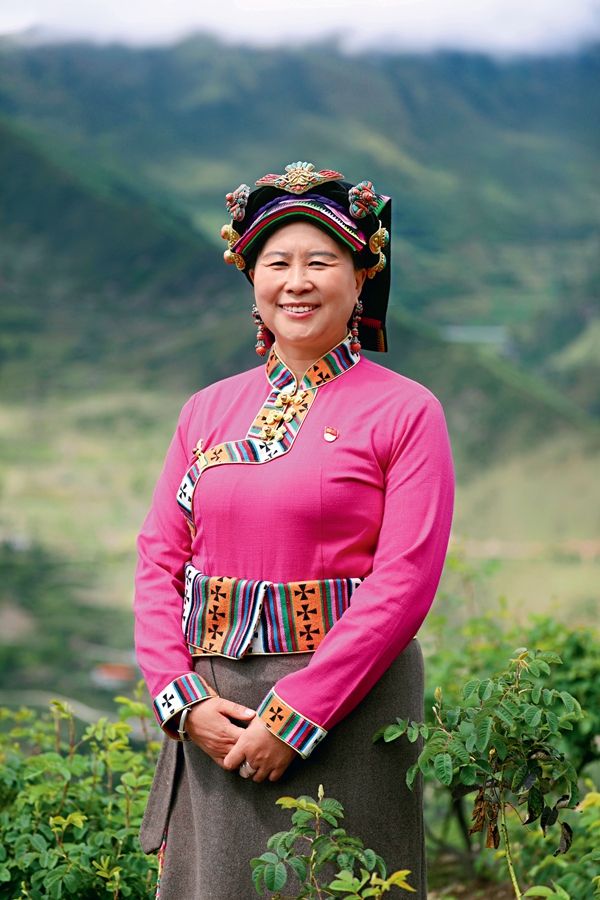
Chen Wanghui, a delegate to the 20th National Congress of the Communist Party of China (CPC), is secretary of the CPC branch of Maoshui Village, in Xiaojin County, in Southwest China's Sichuan Province. During the past decade, she has led the locals in shaking off poverty by planting roses; in so doing, she and the villagers have transformed Xiaojin into the country's highest, and largest, rose-plantation base. Chen is committed to incorporating development of the rose business into implementation of rural revitalization, as a way of building Xiaojin into a beautiful place at the foot of Jiajin Mountain. The locals cordially refer to Chen as "Rose Sister" and "Rose Secretary," in recognition of her sacrifices to help them.
New Path to Common Prosperity
At an altitude of nearly 3,000 meters, Maoshui is a remote village with little fertile farmland, and lack of convenient transportation.
In the past, young people in Maoshui often found temporary work in far-off cities, leaving their land uncultivated. However, thanks to the development of the rose business, the lives of the locals have gradually improved.
"The once impoverished village has installed new streetlights and rebuilt its roads. The courtyards of the locals are also being used to grow roses," says Chen.
Early in 2006, Chen and her husband managed a restaurant and hotel, which brought them a stable income, and a very good reputation among the locals.
Chen explains how she felt a sense of responsibility to help the locals become prosperous, especially after she learned many of the residents did not have money to send their children to school, or to see a doctor.
The first thing Chen did after she was elected director of the village committee, in 2010, was to help build new roads. After that, she searched for ways help the locals lead well-off lives.
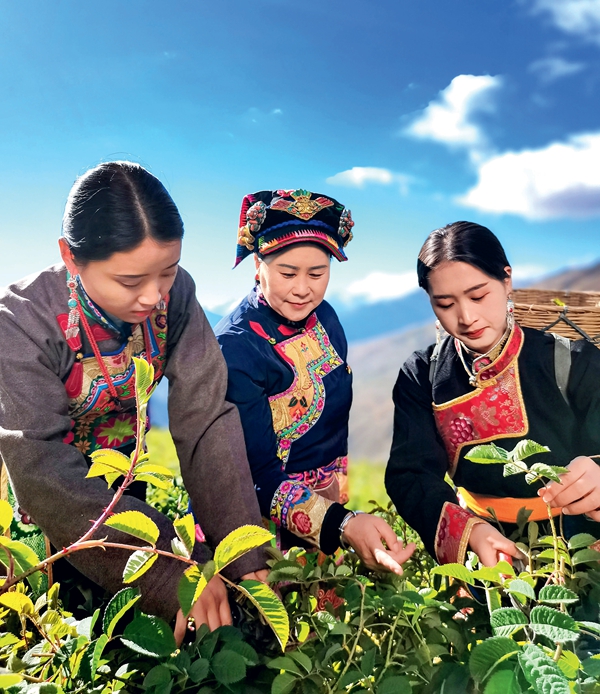
Economic Opportunities from Wild Roses
During the early days after her election, Chen felt overwhelmed as she thought about ways to realize her dream, though she was keen to fulfill her aspiration.
Maoshui used to be widely known as an impoverished village. The locals hardly made ends meet by planting and harvesting corn, potatoes and wheat, all of which were often eaten by wild pigs.
During an inspection tour of crops damaged by boars, Chen noticed several wild roses on the farmland, and quickly learned the roses grew well because they were protected by their spiny leaves. In addition, the high altitude and strong sunlight made Maoshui an ideal place to grow high-quality roses.
Chen thought about it, and eventually came up with the idea to establish a plantation of roses, with the participation of elderly residents, and residents with disabilities.
In 2012, Chen visited rose farmers in 24 provincial-level regions, and she asked them to share the best techniques to grow roses. Later, she successfully planted eight rose species, and she cultivated a new variety by crossbreeding the local wild rose with the Pingyin-style rose, of East China's Shandong Province.
After the new rose species were welcomed in the market, Chen processed them into rose sauce and rose tea, and she entrusted a Lanzhou-based plant to extract high-quality rose oil.
The roses from Maoshui received high acclaim from experts for their high quality, special fragrance and zero pesticide residue.
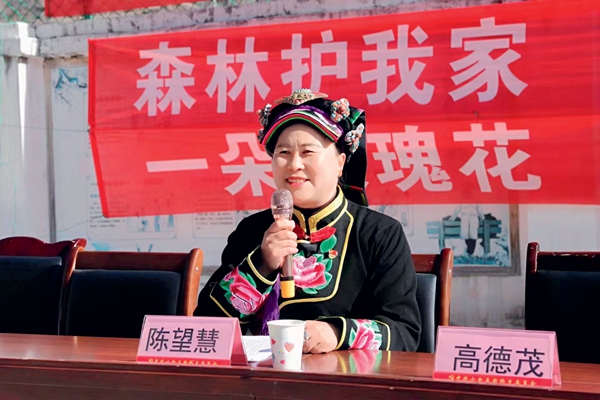
Thanks to its favorable climate and soil, Maoshui has outperformed many other areas in China in the development of its rose business, especially in terms of investment and economic returns.
Chen says it is okay for both children and the elderly to harvest the roses. Under her guidance, some village officials, and villagers, began planting roses.
In addition, Chen organized the village to establish a rose plantation cooperative, and through the cooperative purchased roses from farmers at prices higher than the market during the off-season. Chen also worked with relevant government departments to receive policy and financial support from government.
Inspired by Maoshui's success, Chen set a higher dream, to help more people from Xiaojin benefit from planting and harvesting roses. Nowadays, people from more than 40 villages in Xiaojin are growing roses on their land to increase their incomes.
Chen has also explored a new business model, which involves CPC branches, enterprises, rural cooperatives, farmers and plantation bases, to bolster the planting of roses among locals.
With Chen's support, Yu Fuliang, a farmer with a disability, began growing roses in 2015. He earned 3,700 yuan (US $529) from the business in the next year. He now manages four mu (about 0.27 hectare) of rose gardens, and he has an annual income in excess of 40,000 yuan (US $5,714).
"Planting roses is a lucrative business for people like me, in mountainous areas, to sustain a better life," says Yu.
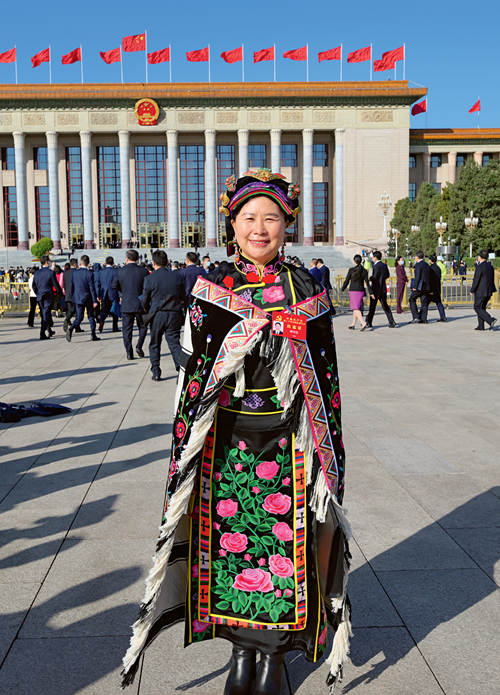
In 2016, Chen was voted secretary of the CPC branch of Maoshui. The next year, she sold her houses, borrowed money from relatives and friends, and used all of her savings to build a workshop for producing rose-related products.
The workshop, which covers more than 4,000 square meters, has developed dozens of rose-related products, which are in high demand at home and abroad.
Moreover, Chen has worked with a Shenzhen-based enterprise to develop mouthwash and cosmetics.
The rose-plantation base, founded by Chen, has become a pillar industry for Xiaojin, and it has helped lift locals out of poverty. Data indicate about 1,200 former impoverished households, and 470 families with disabled people, from 31 villages have been lifted out of poverty by growing roses.
Rose farmers have an average annual income ranging from 50,000 yuan (US $7,143) to 100,000 yuan (US $14,286).
Chen says she will strive to integrate planting of the roses with the development of the local tourism industry, to promote rural revitalization and create additional sources of income for the locals.
Blueprint for Countryside Development
Xiaojin has built 110 mu (7.3 hectares) of rose-exhibition parks, rose valleys and experience zones, and the county has established a comprehensive industrial chain related to rose plantation, processing, sales, sightseeing, experience, teaching and research.
The special tourism-development approach, which is integrated with visiting former revolutionary sites and appreciating rose flowers and tea, has become a new driving force for the development of the rural tourism industry.
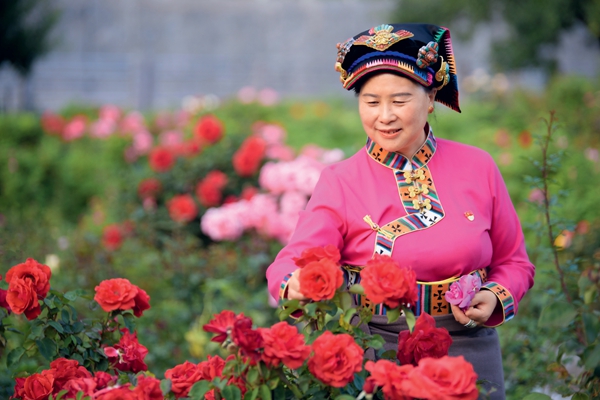
In 2019, Xiaojin held its first Qixi Rose Festival, to strengthen development of its rose industry.
Last year, Chen raised more than 30 million yuan (US $4.3 million) to build a research building, which created about 200 employment opportunities for residents.
On Chen's proposal, Maoshui established a special fund to support environmental conservation, in a bid to achieve the harmonious co-existence between humanity and nature.
Chen says, as a village official, it is her duty to do more concrete work for grassroots people, and to lead them as they strive to live a promising life, adding her election as a delegate to the 20th CPC National Congress has given her an additional sense of responsibility.
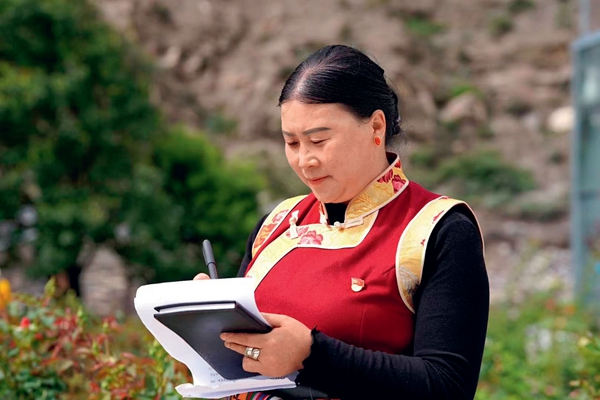
Since her attendance at the congress in Beijing last October, Chen has participated in about 40 publicity and education sessions, to speak about the guiding principles stemming from the congress. As a grassroots delegate, she will remain true to her mission, deepen theoretical studies relating to agricultural and rural affairs, endeavor to be a contributor to and participant of the implementation of the rural revitalization strategy, and do her utmost to achieve common prosperity and advance the building of an ecological civilization.
Over the past decade, Chen has been awarded many high-level honors, such as national role model in poverty alleviation, National Outstanding CPC Member and National March 8th Red-Banner Holder, in recognition of her contributions and sacrifices to the economic and social development of her hometown.
"I never expected planting roses would bring our village onto the path of economic prosperity. I believe the future of our village will be bright as roses," says Chen.
Photos Supplied by Interviewee
(Women of China English Monthly March 2023 issue)
Please understand that womenofchina.cn,a non-profit, information-communication website, cannot reach every writer before using articles and images. For copyright issues, please contact us by emailing: website@womenofchina.cn. The articles published and opinions expressed on this website represent the opinions of writers and are not necessarily shared by womenofchina.cn.







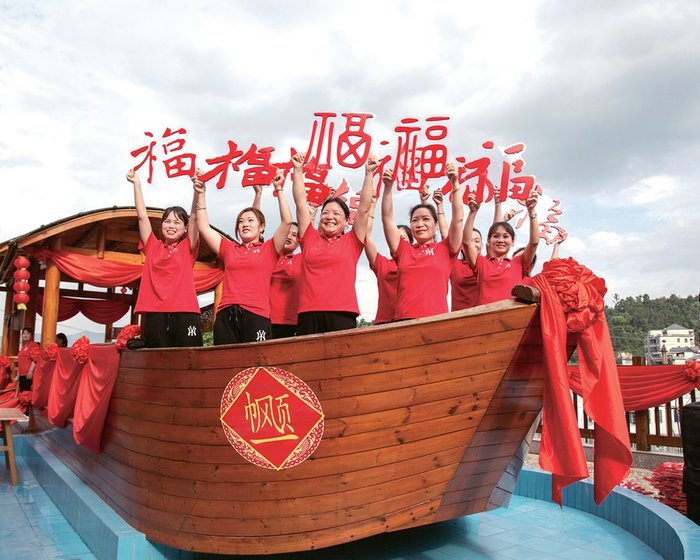
.jpg)

 WeChat
WeChat Weibo
Weibo 京公网安备 11010102004314号
京公网安备 11010102004314号